This question, asked by one of our lead analysts, kept me up at night for a week. One of her clients in a very competitive industry suffered from low Google Ads Quality Scores (QS) for a few valuable keywords. Any improvements would lead to cost savings and higher ROI.
I made it my mission to answer this question.
As an agency owner, how could I justify recommending Unbounce to our digital marketing clients if the landing pages contributed to lower Quality Scores?
What started as a simple question grew into a weeks-long analysis of 1.7 million data points from just under 1 million active keywords. Finally, after literally having to buy a more powerful computer to crunch the data, I have the answer—and it’s not a simple yes or no. To understand fully, one needs to know the three Google Ads Quality Score factors.
What is Google Ads Quality Score?
First, the simple answer: Within the Google Ads interface, QS approximates a keyword’s expected performance in ad auctions, expressed as a number from 1 to 10. Keywords with high QS (8-10) are generally deemed to be more relevant to searcher intent and are rewarded with a lower Cost Per Click (CPC) than keywords with low QS (1-6).
But it’s not that simple.
Google Ads Quality Score is one of the least-understood metrics in all of digital marketing, yet it impacts every single Google search result. Surface-level simplicity quickly gives way to a black box of unknowable complexity as Google tries to match the right keywords to the right users at the right price.
Dig a little deeper, and you’ll notice that Quality Score is actually made up of three components:
- Expected Click-Through Rate: the likelihood that your ad will be clicked
- Ad Relevance: how closely your ad matches the searcher’s intent
- Landing Page Experience: how relevant, transparent, and easy-to-navigate your page is for users
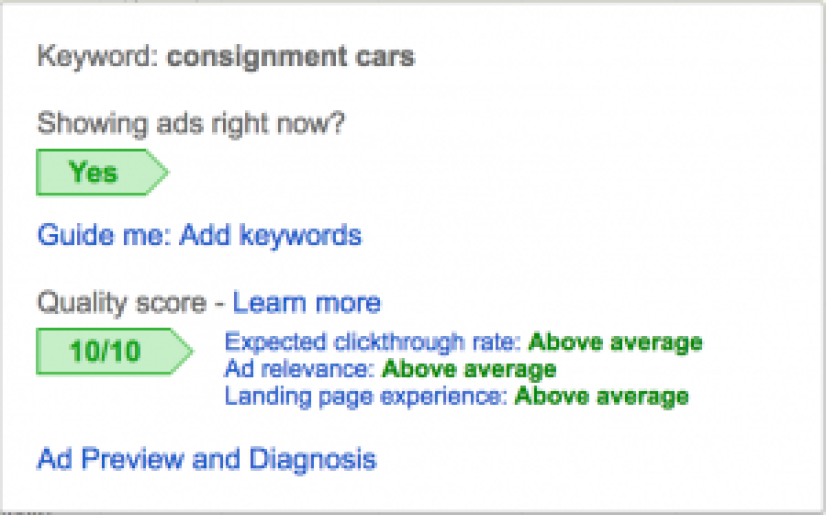
It’s far outside the scope of this article to discuss Quality Score in greater detail, but for my analysis I was primarily concerned with Unbounce landing pages’ impact on the Landing Page Experience component.
Unfortunately, the Google Ads interface allows advertisers to see the three QS components for only one keyword at a time. There is no easy option for exporting these details for deeper analysis. This complicated the data collection because I wanted to compare keywords across multiple accounts over a long period of time.
Enter The Google Ads API.
Google recently updated the API to include the three Quality Score components for every search keyword. This was the easiest way to retrieve keyword-level QS data.
Data Collection, Segmentation, and Analysis
Gathering the data was the easy part. A few queries and several hours of normalization later, I had keyword-level QS data in an Excel file with 1.7 million rows just waiting to be analyzed.
Next, I queried the API for ad-level Destination and Final URLs and matched these to keywords based on ad group IDs in Excel. This single Match/Index function took more than six hours to run in Excel on a Mac. Not one to give up, I actually purchased a beefy quad-core PC because I wanted to complete my analysis in under a decade and take advantage of PC-only statistical packages.
Every account and keyword is unique.
To get as close to an “apples to apples” comparison as possible, I had to segment and label my keywords several ways:
- Account: so I could look for outliers or similarities in industries
- Brand vs. Non-Brand: so I could control for the impact of brand on keyword-level QS
- Device: so I could isolate the impact of device type and mobile-responsiveness
- Landing Page Host: so I could compare Unbounce landing pages vs. clients’ own sites
Do Unbounce Landing Pages Affect Quality Score?
In short, yes! Non-branded keywords that point to Unbounce landing pages have higher average Landing Page Experience scores than non-branded keywords that point to client websites.
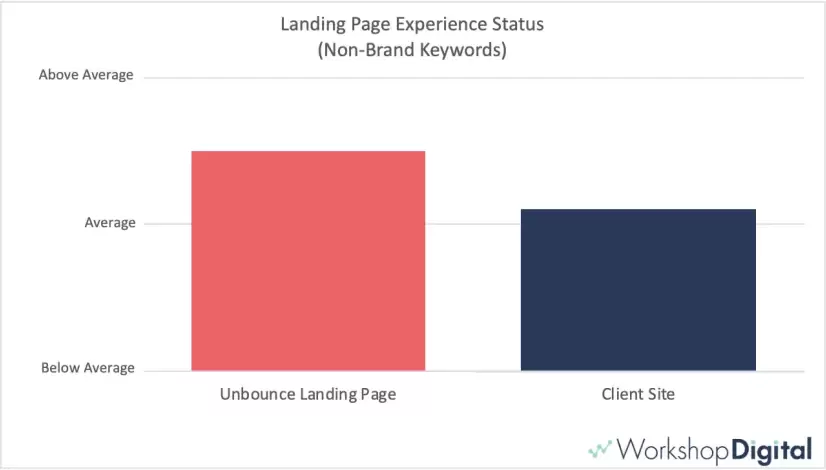
The data, taken from a cross-section of accounts and controlling for many variables, show that Unbounce landing pages can help improve Google Ads Quality Score.
Landing pages are, by design, more relevant to the search keywords and have a highly-targeted call to action. This enhances the user experience, increases engagement, and improves the likelihood of getting a conversion.
Put another way, landing pages built on Unbounce can contribute to lower average Costs Per Click (CPC) and higher Ad Rank compared to AdWords destination pages hosted within corporate sites.
The pattern holds across all device types and other variables such as keyword match types, Google Search vs. Search Partners, and average position.
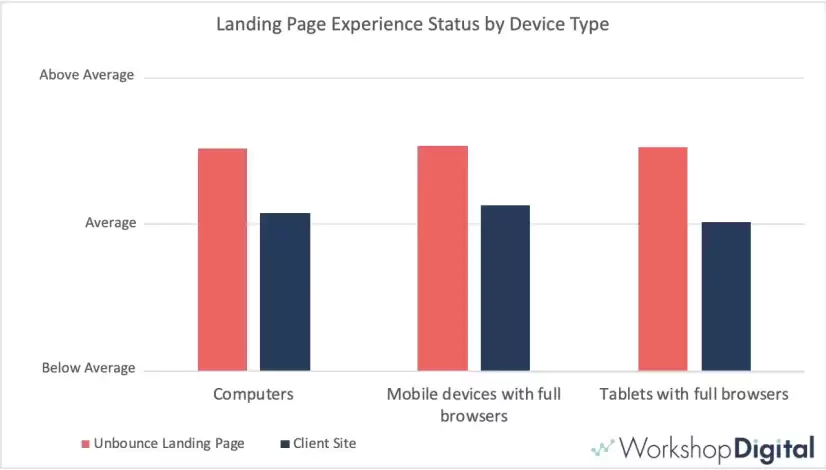
Are You Seeing Different Results?
Your Quality Score analysis could show different results for Unbounce pages vs. corporate websites. First, some corporate sites are very well optimized and have more engaging features that could positively impact the Landing Page Experience portion of the QS equation.
It is entirely possible that an Unbounce page can be configured to be less friendly to the Google AdsBot crawler and/or have impediments that degrade a visitor’s experience.
Finally, some Google Ads Quality Scores don’t appear consistently across keywords because we see only a subset of the actual signals used to determine QS.
Why Use Landing Pages?
Quality Scores don’t tell the whole story because they are simply an approximation of a keyword’s expected performance. So why should lead generation advertisers use landing pages?
It’s the Conversion Rates! Quality Scores don’t mean anything if visitors aren't converting on our landing pages.
For clients that depend on a steady stream of qualified sales leads, Unbounce landing pages have Conversion Rates that are 26% higher than corporate sites for non-branded keywords.
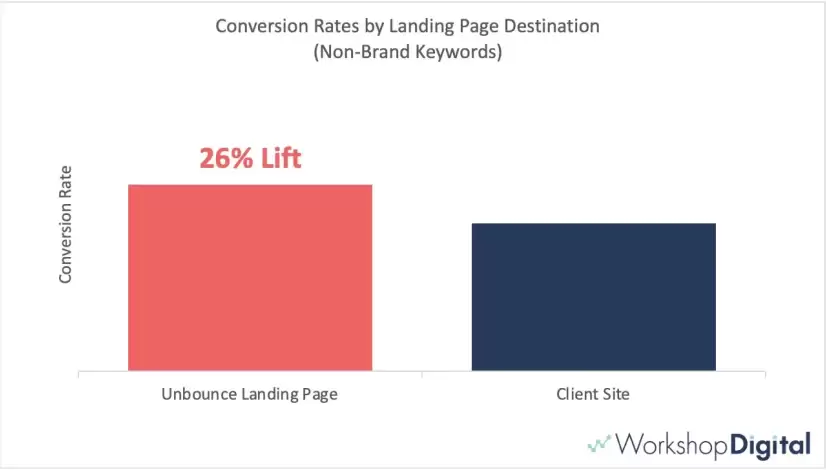
Branded keywords (people searching for a company by name) actually see a 117% lift in Conversion Rates by sending traffic to Unbounce landing pages. Why? Because those searchers have a high level of intent and are generally lower in the conversion funnel (i.e. ready to buy) than non-brand searchers.
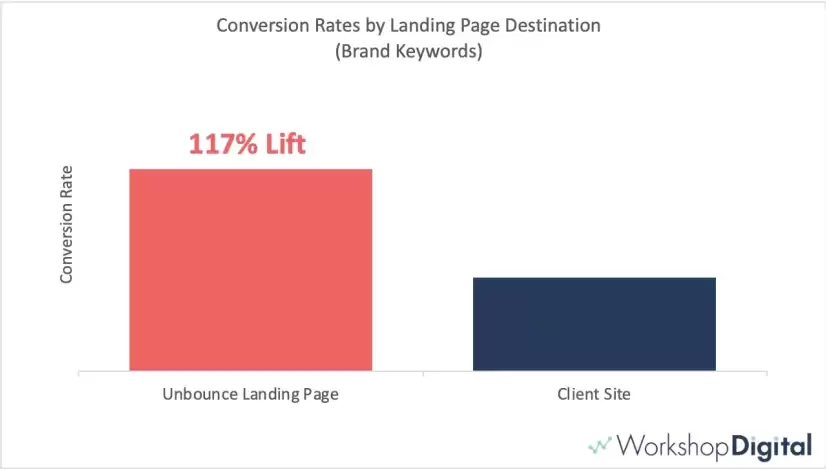
It doesn’t matter how we break out the results. When comparing apples to apples, landing pages drive more leads, more sales, and more revenue for our clients.
Why? Landing pages are designed to convert visitors to prospects.
If you're not seeing results like this, we can help! Check out the solutions we offer.

